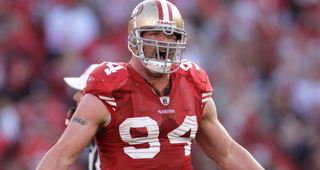There have been five 5,000 yard passing seasons in NFL history. Three -- Drew Brees (5.476), Tom Brady (5,235) and Matt Stafford (5,038) -- were in 2011. If Aaron Rodgers (4,643) hadn’t sat in the final week of the season and let his backup throw for 480 yards, he might have been the fourth quarterback to reach that mark. Passing offenses reigned supreme in 2011, the culmination of a series of changes to both the rules and the types of players entering the league over the last generation.
In 2011, the New England Patriots, New Orleans Saints and Green Bay Packers combined to go 41-7 in the regular season. Through the first two weeks of 2012, they are 2-4. It’s not a big enough sample size to draw many conclusions, but it suggests the possibility that 2012 may be the year the passing revolution hits a speed-bump.
Of course, there are plenty of micro-level explanations for all three teams struggles. The Patriots lost a bizarre game to the Arizona Cardinals when the normally reliable Stephen Gostkowski missed a 42-yard field goal, the Packers' defense continues to be a shadow of the unit that helped them win Super Bowl XLV and the winless Saints have had ... more than their share of troubles over the last nine months.
However, there is an interesting macro-level trend emerging, especially if you look at how the San Francisco 49ers defeated the Packers and Stafford’s Lions in consecutive weeks. With a “game manager” under center in Alex Smith, they’ve been outgained through the air by almost 100 yards in their first two games but have won the rushing battle by 73 yards.
Rather than being built around their quarterback, they are built around their front seven, the most talented group in the NFL. Justin Smith made the All-Pro team twice in 2011, as a first-team DT for his role in their 4-2 nickel and a second-team DE for his role in their 3-4 base defense. Patrick Willis, a four-time first-team All-Pro selection, is widely considered the best ILB in the NFL and NaVorro Bowman is probably the second best ILB. Aldon Smith, meanwhile, is coming off a 14-sack rookie season as an edge rusher.
With one Smith controlling the line of scrimmage, another Smith flying off the edge and Willis/Bowman cleaning up any traffic in the middle, the 49ers were able to control the box against both Green Bay and Detroit. As a result, they made the two high-powered offenses completely one-dimensional, with Cedric Benson and Kevin Smith combining for 71 yards on 25 carries in the two games.
If a defense can win the battle in the trenches without sending any extra men, there isn’t much a great quarterback can do. That’s what happened when the Giants upset the 18-0 New England Patriots in Super Bowl XLII, holding the most explosive offense in NFL history to 14 points. Brady can dissect a team who blitzes too many defenders, but there isn’t much he can do when they can drop seven and get consistent pressure with their front four.
On offense, the 49ers pounded defenses designed to protect leads and rush the passer, not win field-possession games in the trenches. San Francisco had 14 rushing first downs compared to only five for their opponents, who were playing from behind most of the game. The final scoring margins are a bit deceptive: Green Bay had a punt return TD and Detroit was down 27-12 with 1:29 left when they scored their first TD.
By the conventional wisdom of the modern NFL, such an old-school style of football is no longer a winning formula, not when passing offenses can roll up points and yards so quickly. However, those offenses depend on timing and execution, which can be disrupted by sitting on the bench for long stretches of games and keeping pass rushers in a QB’s face all game long. At the same time, it’s much easier to rush the QB when you can pin your ears back and not worry about the run game.
A quarterback is still only one man on a roster of 53. While the last nine teams to win Super Bowls have had a QB bound for Canton under center, that’s more a self-fulfilling prophecy than a model for building a team. Eli Manning didn’t win two Super Bowls because he is a Hall of Fame player; he’s a Hall of Fame player because he won two Super Bowls.
Having a great QB is more important than it’s ever been before, but the NFL isn’t a 7-on-7 league, at least not yet. In the 2011 draft, San Francisco took Aldon Smith over three QB’s taken in the next five picks -- Jake Locker, Blaine Gabbert and Christian Ponder. Rather than reaching to find the next great QB, they stayed with their draft board and built a team that could beat one.

Jonathan Tjarks wrote on the NBA for RealGM from 2011-2016 before joining The Ringer.
Follow @JonathanTjarks on Twitter.


